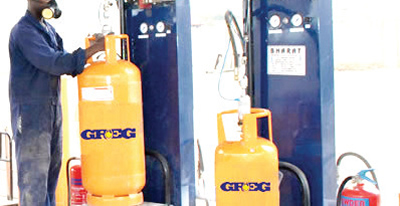The Federal Ministry of Petroleum Resources has joined forces with the Nigerian Midstream and Downstream Petroleum Regulatory Authority (NMDPRA) to promote the adoption of cooking gas across Nigeria. This collaborative effort aims to enhance the accessibility, affordability, and safety of liquefied petroleum gas (LPG) for households and businesses, thereby encouraging a shift from traditional cooking methods to more efficient and environmentally friendly alternatives.
### Objectives of the Collaboration
The primary goal of this collaboration is to increase the utilization of cooking gas as a primary source of energy for cooking and heating in Nigeria. The initiative recognizes the numerous benefits associated with LPG, including its clean-burning properties, cost-effectiveness, and potential to reduce deforestation and indoor air pollution caused by the use of firewood and kerosene.

1. **Enhancing Accessibility**: One of the key objectives of the collaboration is to improve access to cooking gas, particularly in rural and underserved areas. The government plans to work with stakeholders in the LPG value chain to ensure that distribution networks are expanded, making it easier for consumers to obtain cooking gas.
2. **Affordability Initiatives**: The ministry and NMDPRA are also focusing on making cooking gas more affordable for the average Nigerian household. This includes exploring pricing strategies, subsidies, and partnerships with private sector players to lower the cost of LPG cylinders and refills.
3. **Safety Standards and Regulations**: Ensuring the safe usage of cooking gas is paramount. The collaboration seeks to establish and enforce stringent safety standards and regulations in the LPG sector. This includes conducting public awareness campaigns on safe handling and usage practices, as well as providing training for LPG marketers and distributors.
### Benefits of Cooking Gas Adoption
The promotion of cooking gas is expected to yield several benefits for Nigerian households and the environment:
1. **Health Benefits**: Cooking with gas significantly reduces indoor air pollution compared to traditional cooking methods. This shift can lead to improved respiratory health and overall well-being for families, particularly women and children who are often more exposed to harmful emissions from burning wood or kerosene.
2. **Environmental Impact**: Increased adoption of LPG can help mitigate environmental degradation caused by deforestation. As more households transition to cooking gas, the demand for firewood will decrease, contributing to the preservation of forests and biodiversity.
3. **Economic Opportunities**: The expansion of the LPG market presents economic opportunities for various stakeholders, including entrepreneurs, marketers, and distributors. This initiative could stimulate job creation and foster economic growth within the energy sector.
### Challenges to Overcome
Despite the clear benefits of promoting cooking gas, several challenges must be addressed to ensure the successful implementation of this initiative:
– **Consumer Awareness**: There is a need for comprehensive awareness campaigns to educate consumers about the advantages of using cooking gas and how to safely use it. Many households may be hesitant to switch from traditional fuels due to a lack of information or misconceptions about LPG.
– **Infrastructure Development**: The effective distribution of cooking gas requires adequate infrastructure, including storage facilities, transportation systems, and refill stations. The collaboration must prioritize the development of these essential components to enhance the availability of LPG.
– **Affordability Concerns**: While efforts are being made to make cooking gas more affordable, fluctuations in global oil prices can impact LPG prices domestically. The government will need to implement strategies to cushion consumers from price volatility and ensure that cooking gas remains a viable option for all.
### Public Engagement and Partnerships
To maximize the impact of this initiative, the ministry and NMDPRA plan to engage with various stakeholders, including local governments, non-governmental organizations, and the private sector. Collaborative partnerships will be essential in driving the campaign for cooking gas adoption and addressing the challenges that may arise.
1. **Community Outreach Programs**: The government intends to launch community outreach programs aimed at raising awareness about the benefits of cooking gas. These programs will include workshops, demonstrations, and informational sessions to educate households on safe usage and handling of LPG.
2. **Incentives for Adoption**: The ministry may explore offering incentives for households to transition to cooking gas, such as subsidized cylinder purchases or rebates on gas refills. These incentives could help lower the financial barriers that prevent families from adopting LPG as their primary cooking fuel.
### Conclusion
The collaboration between the Federal Ministry of Petroleum Resources and the NMDPRA to boost cooking gas adoption represents a significant step towards promoting cleaner and more efficient cooking methods in Nigeria. By enhancing accessibility, affordability, and safety, this initiative has the potential to transform the energy landscape and improve the quality of life for countless Nigerians.
As the initiative progresses, ongoing public engagement, partnerships, and infrastructure development will be crucial to overcoming challenges and ensuring the successful adoption of cooking gas. With a concerted effort from all stakeholders, Nigeria can move towards a more sustainable and healthier energy future.
Support InfoStride News' Credible Journalism: Only credible journalism can guarantee a fair, accountable and transparent society, including democracy and government. It involves a lot of efforts and money. We need your support. Click here to Donate
